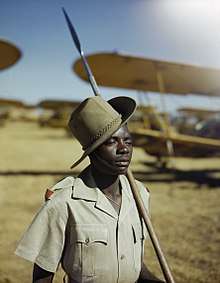assegai
English

A guard with assegai in South Africa, 1943.
Alternative forms
Etymology
From French azagaie (now zagaie) or Portuguese azagaia, Spanish azagaya, from colloquial Arabic اَلزَّغَايَة (az-zaḡāya), from Proto-Berber *zaġāya (“spear”).
Pronunciation
- (UK) IPA(key): /ˈæsəɡaɪ/
Noun
assegai (plural assegais)
- A slim hardwood spear or javelin with an iron tip, especially those used by Bantu peoples of Southern Africa.
- 1898, Winston Churchill, chapter 8, in The Celebrity:
- My client welcomed the judge […] and they disappeared together into the Ethiopian card-room, which was filled with the assegais and exclamation point shields Mr. Cooke had had made at the sawmill at Beaverton.
- 1902, Joseph Conrad, Heart of Darkness, Tank Form 2007, p.99:
- Native mats covered the clay walls; a collection of spears, assegais, shields, knives was hung up in trophies.
- 1922, James Joyce, Ulysses:
- A birdchief, bluestreaked and feathered in war panoply with his assegai, striding through a crackling canebrake over beechmast and acorns.
- 1994, Nelson Mandela, Long Walk to Freedom, Abacus 2010, p. 32:
- Without a word, he took my foreskin, pulled it forward, and then, in a single motion, brought down his assegai.
-
- The tree species Curtisia dentata, the wood of which is traditionally used to make assegais.
Translations
slim hardwood spear or javelin with an iron tip
- The translations below need to be checked and inserted above into the appropriate translation tables, removing any numbers. Numbers do not necessarily match those in definitions. See instructions at Wiktionary:Entry layout#Translations.
Verb
assegai (third-person singular simple present assegais, present participle assegaiing, simple past and past participle assegaied)
- To spear with an assegai.
See also





This article is issued from
Wiktionary.
The text is licensed under Creative
Commons - Attribution - Sharealike.
Additional terms may apply for the media files.